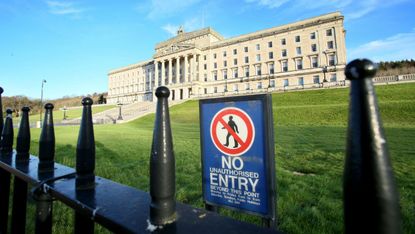Will cutting MPs’ pay break Northern Ireland deadlock?
Stormont’s 600-day impasse sets world record for longest peacetime period without a government

Northern Ireland assembly members are to have their pay slashed in a bid to break the political deadlock that has left the region with no government for almost 20 months.
Karen Bradley, the Northern Ireland secretary, has said Stormont members (MLAs) are not “performing the full range of their legislative functions” and would have their pay cut by more than £13,000, from £49,500 to £35,888.
The move follows prolonged failure to heal the bitter divide between the Democratic Unionist Party (DUP) and Sinn Fein, and restore their coalition.
Subscribe to The Week
Escape your echo chamber. Get the facts behind the news, plus analysis from multiple perspectives.

Sign up for The Week's Free Newsletters
From our morning news briefing to a weekly Good News Newsletter, get the best of The Week delivered directly to your inbox.
From our morning news briefing to a weekly Good News Newsletter, get the best of The Week delivered directly to your inbox.
Last week, Northern Ireland passed Belgium for the world’s longest peacetime period without a functioning government, surpassing 590 days.
Irish nationalists pulled out of the power-sharing executive in January 2017 following a row over the official status of the Irish language and claims they were not being treated as equal partners by the pro-British DUP.
The subsequent confidence and supply agreement reached between the DUP and Theresa May following last year’s general election has also raised questions about the Westminster government’s impartiality.
Despite numerous aborted efforts to resolve the disputes, Bradley has also ruled out calling a fresh Assembly election. Instead, she is to bring forward legislation to formally allow Northern Ireland’s civil servants to make the decisions needed to keep the country running in the absence of the devolved government.
“The move is the latest step towards re-imposing direct rule of the region, including imposing a budget directly from London” says Reuters, something the British government has been reluctant to do until now “for fear of angering Irish nationalists and the Irish government”.
Create an account with the same email registered to your subscription to unlock access.
Sign up for Today's Best Articles in your inbox
A free daily email with the biggest news stories of the day – and the best features from TheWeek.com
-
 Antony Gormley's Time Horizon – a 'judgmental army' of 100 cast-iron men
Antony Gormley's Time Horizon – a 'judgmental army' of 100 cast-iron menThe Week Recommends Sculptures are 'everymen questioning the privilege of their surroundings' at the Norfolk stately home
By Adrienne Wyper, The Week UK Published
-
 'King's horses take free rein through London'
'King's horses take free rein through London'Today's Newspapers A roundup of the headlines from the US front pages
By The Week Staff Published
-
 Is pop music now too reliant on gossip?
Is pop music now too reliant on gossip?Talking Point Taylor Swift's new album has prompted a flurry of speculation over who she is referring to in her songs
By Richard Windsor, The Week UK Published
-
 Roman-era Brits kept lap dogs
Roman-era Brits kept lap dogsfeature And other stories from the stranger side of life
By Chas Newkey-Burden Published
-
 ‘Boris Johnson measures success in biceps rather than brain power’
‘Boris Johnson measures success in biceps rather than brain power’Instant Opinion Your digest of analysis from the British and international press
By The best columns Published
-
 ‘France looks more ungovernable than ever’
‘France looks more ungovernable than ever’Instant Opinion Your digest of analysis from the British and international press
By The best columns Published
-
 ‘Britain needs a democratic monarchy’
‘Britain needs a democratic monarchy’Instant Opinion Your digest of analysis from the British and international press
By The best columns Published
-
 Home Office worker accused of spiking mistress’s drink with abortion drug
Home Office worker accused of spiking mistress’s drink with abortion drugSpeed Read Darren Burke had failed to convince his girlfriend to terminate pregnancy
By The Week Staff Published
-
 In hock to Moscow: exploring Germany’s woeful energy policy
In hock to Moscow: exploring Germany’s woeful energy policySpeed Read Don’t expect Berlin to wean itself off Russian gas any time soon
By The Week Staff Published
-
 Were Covid restrictions dropped too soon?
Were Covid restrictions dropped too soon?Speed Read ‘Living with Covid’ is already proving problematic – just look at the travel chaos this week
By The Week Staff Last updated
-
 The Week Unwrapped: Afghanistan, Florida and Northern Ireland
The Week Unwrapped: Afghanistan, Florida and Northern Irelandpodcast Can the World Bank set the Taliban straight? Why is Florida saying ‘don’t say gay’? And what can we learn from the last trials of the Troubles?
By The Week Staff Published